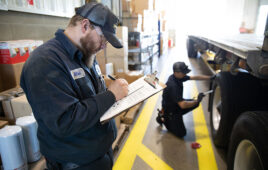Circle K and Worsley roll out innovative programs to streamline costs and boost
profitability.
By John Lofstock, Editor
With fuel prices soaring to record highs, marketers are desperately looking for
software solutions that can help them manage the business more effectively. On the fuel
supply side, tighter control of distribution could enhance margins and increase overall
profitability, so it should be no surprise that savvy operators like Circle K and The
Worsley Cos. are rolling out innovative technology programs to streamline
operations.
At 138 stores and growing, Wilmington, N.C.-based Worsley was looking for a
communications solution that enables all technical applications in its convenience
stores to flow through one broadband pipe. After testing several firms, it stuck with
TNS Inc., a data communications firm based in Reston, Va.
The decision to go to broadband was a relatively easy one for Worsley,
according to Kevin Kolb, the company’s director of information systems. Worsley views
the connectivity as an essential part of business in today’s fast-paced market.
However, its partnership with TNS was rather serendipitous. While working with Time
Warner Cable, the marketer was extremely disappointed with its speed and reliability.
“It just wasn’t reliable and it wasn’t meeting our needs,” Kolb said.
While reviewing the long-term impact cable connectivity would have in vital areas
like the POS and fuel interface systems,the company concluded Time Warner was not the
solution. Around the same time, a simple cold call from TNS made all the
difference.
“They became what appeared to be a big answer to a big problem,” Kolb said. “I’m not
sure we had other solutions on the radar so they just walked into the right place at
the right time.”
Worsley is in the process of rolling broadband out to all of its stores at an
average of about 15 units per week.
“Right now we are using a batch process that requires all stores to dial in for
price updates and transmitting reports,” Kolb said. “This is a lengthy and costly
process. Many units have to make long-distance phone calls that can take up to an hour
per store. With 138 stores, it gets expensive and ties up the phone lines. With
broadband, updates are virtually instant and dedicated phone lines aren’t needed. In
fact, we expect to be able to reduce the number of phone lines we have at each store
further enhancing our savings.”
Another area where TNS is helping streamline fuel operations is by reducing the time
it takes to transmit credit card transactions. Using the IP-based broadband connection,
payatthe-pump transactions were reduced from five seconds to two seconds versus dialup.
However, this system will only apply to stores flying Worsley’s proprietary Carolina
Petro fuel brand.
Big Oil brands have yet to embrace broadband connectivity at the local level, even
though it is just as fast and safe as the satellite transmissions they provide. Worsley
is partnered with ExxonMobil, BP and Shell.
Retailers speculate that Big Oil will be slow to embrace local broadband as a method
of communication because it’s a service for which they are charging retailers. IP data
is encrypted and KISS compliant and certified. TNS already has established
relationships with all the major credit card processors, making for a smooth transition
to broadband on in-store debit-and creditcard transactions.
Inventory control
As it looks at other cost-saving measures,
Worsley was quick to recognize that a common problem retailers face with manual
operations is that they do truck rolls too soon or too late and, depending on which way
the cost of fuel is going, that could be a costly mistake. The goal is to top off tanks
when prices are increasing and let levels fall when prices are retreating.
Worsley typically relies on a gas station attendant to measure tanks manually once a
day, which is not an efficient method.
“Because we are putting tank devices on the network, we can pull inventory data any
time of the day, usually less in than a minute. Compare that to the conventional method
of using a stick to measure tanks and then manually calling in a fuel
order—the time-savings per store is enormous,” Kolb said. “Plus, the
automated system is always accurate.
“What you don’t want to do is tie inventory dollars underground. This could further
diminish already weak fuel margins.”
Like Worsley, Circle K, now a subsidiary of Canadian marketer Alimentation
Couche-Tard, needed to put a system in place to track motor fuel inventories in
hundreds of locations-that must convert fuel supplies from summer to winter fuel
stocks.
This bi-annual conversion placed a heavy burden on Circle K’s fuel department
personnel, who were relying on manual processes for procurement, inventory management
and environmental and regulatory compliance. Circle K, which has 2,100 stores across
the U.S., required a system that:
- Reduced administrative paperwork
- Eliminated manual data entry and the likelihood of human error
- Decreased labor costs
- Mitigated compliance risks
Strategy and implementation
About two years ago, Circle K
identified its retail solution. It chose to begin implementation of FuelQuest’s Fuel
Management System (FMS) Air Quality Compliance module (AQC).
FuelQuest’s FMS software provides Circle K’s fuel team with a transition management,
tracking and reporting platform for sites that operate in geographies defined by the
EPA and state environmental regulatory agencies. FuelQuest and Circle K were both
involved in the implementation of the FMS product and worked together to complete the
process last year.
Jim Stout, vice president of sales for FuelQuest, said the FMS and AQC modules are
innovative because they provide direct auto-feeds for inventory deliveries.
“Instead of having disparate data feeds coupled with manual data entry, all of these
components are integrated into one central database to ensure data integrity for more
agile, centralized decision-making,” Stout said. “Circle K has a history of being an
industry innovator and this implementation provides unprecedented operational
transparency and productivity gains.”
FuelQuest’s FMS product manages and streamlines the conversion in seasonal gasoline
supplies at approximately 1,000 Circle K locations. During the transition from summer
to winter fuel stocks, FMS tracks inventory levels for all locations to deliver
real-time insights into the number of Circle K tanks that have turned over to the
appropriate stock in order to avoid environmental penalties. This previously manual
entry process required overtime pay and temporary workers, increasing the potential for
human error, which could bring fines of up to $25,000 per tank if inventories were not
properly converted.
“The solution automated this process enabling unparalleled transparency into Circle
K’s business operations and ultimately reduced the workload on the fuel department to
enable them to focus on other core business challenges,” Stout said.
End Results
Theresa Denney, fuel distribution supervisor for
Circle K, said the chain retailer enjoyed an immediate impact on business after
implementing FMS.
“This solution took us light years ahead of where we were,” Denney said.
With the AQC solution in place, Circle K dramatically decreased labor costs
associated with seasonal tank turns. The system automated many complex processes so
that data did not have to be manually keyed into a third system. FMS not only increased
productivity and reduced labor costs, it removed much of the stress on the fuel
department that comes with the summer-winter transition.
Circle K also found their employees were more productive, allowing them time to
addre ss other projects.
“FuelQuest’s solution allows us to mitigate operational and environmental compliance
risks and rely on cleaner, more accurate data to facilitate better decision-making,”
Denney said. “Our locations are now optimizing inventory turns, procurement and
logistics, while still ensuring compliance with all federal and local air quality
regulations.”
Based on conservative ROI estimates, Denney said Circle K has achieved a hard cost
savings of $20,000 per year, not counting potential EPA fines. This saving is based on
the cutback of labor overtime hours, and elimination of temporary jobs over a twomonth
period when the actual turns are made.




